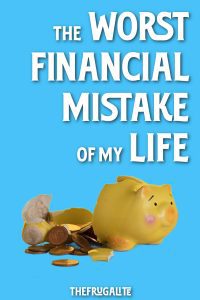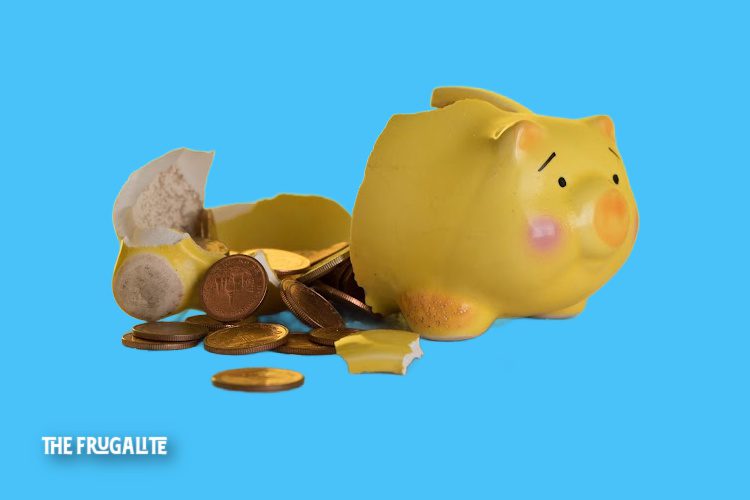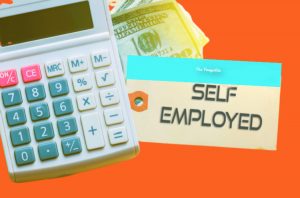(Psst: The FTC wants me to remind you that this website contains affiliate links. That means if you make a purchase from a link you click on, I might receive a small commission. This does not increase the price you’ll pay for that item nor does it decrease the awesomeness of the item. ~ Daisy)
By the author of the FREE online course Growing Self-Sufficiency: The Whole Picture
The Frugalite readers who know me well know that I’m generally a pretty positive person. So, I share my worst financial mistake ever with the intention that my error might actually do something positive if it is able to help someone else in some way. I recently gave it some thought and decided that the worst financial mistake was not living further below my means from the time that I was younger. If I had done that and continually added to a substantial emergency fund, this could have helped me enormously during some difficult times in my life.
I had a good start, but…
As a child, I was hard-working and frugal. I did numerous chores in our home and received a modest allowance. From the time I was 12 years old for a number of years, I had a wide-ranging paper route seven days a week. I saved every cent that I earned in a bank account that was actually earning me a pretty good interest rate back then around 40 years ago. I remember proudly paying for my own field trips with my money. However, I remember when I decided to splurge and spend my hard-earned savings on some trendy clothing that I did not have.
I had no example to follow
At the time that I decided to spend it all on clothing, I do not recall any conversation with my parents about this. Sure, I was, like 14 years old and this was my own money. However, this would have been a learning opportunity for me about always keeping some money in an emergency fund, and to be careful how I spent even my “fun” money.
My parents didn’t really talk to me about money. It seemed like it was a taboo topic, somehow. I wasn’t learning about it in school, either. So, in my formative years, there was a sort of vacuum in terms of how to deal with money. I seemed to pick up messages from society at large, which were more like, “Make money! Spend money! Don’t worry, you can use your credit card if you get into trouble.”
Saving in Hard Times
As I was a student for many years, I had many lean times. However, I do think I could have saved a small amount each week, like even $5. I just got into a mindset of simply trying to survive, without any kind of financial plan or vision. If I had an understanding that everyone, even a twenty-year-old, should have some money set aside, I would have done things differently.
For example, through some hard work, I did save up several thousand dollars when I was around 30. So what did I decide to do? Why, take a trip around the world, of course! It was the trip of a lifetime, with stopovers in Europe, Africa, India, and China. However, because I spent all my savings on my trip, I ended up returning to a very stressful time in graduate school, with no safety net of some savings beneath me. While I loved my trip, and I wouldn’t change it, especially visiting my good friends in Namibia and China, in retrospect, it would have been better to shave off a couple thousand from the budget for my rainy day fund.
Saving in Good Times
I have had time after finishing school with a good job and decent earnings. However, I did not put more away. I continued to live too close to my income. At one time in a large city, I was earning big and spending big: A lot of eating out and a fancy apartment. If I had had a vision for my financial security and future and had saved more of those earnings at that time, it sure would have come in handy. I can see now that it limited my choices. I wanted to move out of the city, and I wasn’t sure how to do it. Having some savings would have given me options then.
What is the Impact?
 If I look back to myself at age 20, I was out of the house, studying full time and working a great job in the summer. If I had started saving for a rainy day with just $CA5 per week (that’s $CA20 a month, folks!), I would now have almost $CA9,000, which is just over $US6,500. I consider that a great emergency fund.
If I look back to myself at age 20, I was out of the house, studying full time and working a great job in the summer. If I had started saving for a rainy day with just $CA5 per week (that’s $CA20 a month, folks!), I would now have almost $CA9,000, which is just over $US6,500. I consider that a great emergency fund.
You can be sure I do things differently now! I learned my lesson and now live well below my means. This has meant that I don’t struggle to save every month. I make it a priority and choose what I buy carefully.
How do I do it? I am happy with what I have. Whatever I need, I can usually thrift it. One of the biggest money drains in my adult life was paying rent. In this article, I offer some ideas on how to pay less for that.
If, like me, you are facing a tight budget, here are some tips on how to start building an emergency fund. A worthy goal would be to aim for one month of your expenses and then gradually expand that to three months, which would be a real cushion in times of need.
If you don’t already have an emergency fund and would like to read some examples of how it can come in handy, here’s a great article by Daisy on just that very topic.
No Regrets, Just Lessons Learned
These days, it is harder than ever to save, but perhaps more important than ever. Do you live below your means? If yes, how do you do it? Has it allowed you to build an emergency fund? Please tell us in the comments below.
About Colette
Colette is passionate about sharing her knowledge of thrifty living and self-sufficiency. She has developed her skills in self-reliance living in the suburbs, the city, and more recently, on her own Half-Acre Homestead. Colette lived five years completely off-grid and without running water in an eight by 24 foot tiny home while designing and building her own 18 by 24-foot eco-cabin. Her website, Half Acre Homestead is attracting followers from around the world who want to become more self-sufficient. Colette invites you to stop by the Homestead and check out all of the great resources including the practical How To Guides, A Tiny Home Resource Center and her organic gardening stories on her blog. She shares her wholistic model (body/mind/spirit) for achieving self-sufficiency in her Free Course, “Growing Self-Sufficiency: The Whole Picture.” Stop by the Homestead today to register free of charge!











16 thoughts on “The Worst Financial Mistake of My Life”
Hey Collette. Thanks for this personal post . I too made huge financial mistakes in my life, but not because I was not forewarned, because my grandparents and mother taught me to save money and buy when things were on sale, or to negotiate prices to get best deal. I was living “high on the hog ” with consumerism and trying to keep up w/ the Jones’ . I one day looked at all the “thingy wingy’s ” I had acquired over the years, all just junk basically , that did not bring me true joy or happiness, just put me in debt.
I have gave away a lot of stuff that was cluttering my house, still have a ways to go, and have also battened down the hatches on my spending about 5 years ago and put every extra penny in a money market account, bought tangible assets for shtf, as well as cancelled all subscriptions that I do not need. And it’s a good thing I did this because Bidenomics is killing me, and everyone else ,but honestly this bad financial stuff has been going on longer than that old coot in the white house has been in office.
I try to instill in my kids that they must have at least $10k in their emergency savings, as well as to live frugally. I hope they are listening to me. I know my brother moved in with me and then just moved out because he was blowing what little money he had on BS and I cannot afford to take care of him, his wife, and their dog, along with my own family. Sad he left because I love him and doubly sad he’s blowing his money and in over $200K debt due to him buying a Semi Truck last year and Yellow Trucking went under, his brand new 2023 Kenworth is a piece of crap that is broke down more than on the road and there is no lemon law on Semi Trucks.
Sometimes ya gotta just walk away from “stuff” . I quit my job last week, and start a new one that is a bit more money, with benefits, next week because my main focus before SHTF is to get my health in check (new glasses dental work, check up, etc) . Also sending Hubby to every single one of his dr’s , optician, dentist while he still has this medicare.
Hi TexasAntigone, I very much appreciate your post and learning more about your own experiences. I agree with you about stuff. I am getting rid of my own. I have cut back my own spending and am doing better now. I know that I can live without basically everything, and I live that way. It has created a new sense of spaciousness in my life that I appreciate each day. I felt sad to read about your brother’s situation. That is good that you tried to help. Our society is a big machine for selling stuff, and as I say in the article, does a pretty good job of convincing us that we “need need NEED” to buy their stuff to feel better about ourselves and to BE better. There are a lot of folks in that situation around here. I wish you the best with your new job. I’m glad to hear of your focus on your health. Good dental health is really a great investment. Hope to hear from you again!
The current economy (whoever is in the White House doesn’t have much, if any, control over the economy) is not as bad as it was in the 80s. A good mortgage rate was 15% and very few banks would loan farmers any money. Those enough fortunate enough to have money made good interest in CDs (paid almost 15%). But it was the era when traditional savings accounts no longer had to pay 5% interest. Unemployment was 25% in some areas, including mine. Inflation was almost 14% in 1980 and 10+% in 1981. No one complained when inflation went negative (2009). And most don’t realize how close we in the US came to negative interest rates (2016, 2017). My emergency fund would not have been in any financial institution. There are downsides to working in the financial sector.
Interest rates were too low for far, far too long. Had suppliers not relied on shrinking the size of the product instead of raising the price, it would not be the shell shock as of late. When it comes to food – as in real ingredients – the farmer isn’t getting paid much more.
Was raised frugal, remain frugal. Kids are frugal. Not saying we don’t splurge occasionally and we do contribute to help others (money, time, and/or goods).
$10K is not a bad emergency fund target. Rule has traditionally been six to eight months of expenses. I’ve always had a year’s worth in my emergency fund.
Hi Selena, Thanks so much. Your perspective and these details around how it was in the 80’s provide some helpful context. That is a great achievement to have a year set aside. These days, especially, I think that is incredibly rare. All of the information I’m reading these days suggests that more and more people are living check to check. I’m so glad that you have been able to model your good habits to your children, too. Wishing you the best. I feel you are quite well prepared!
I taught a number of high school students who had an inflated idea of how they could live on minimum wage jobs. One delightful girl was talking about how she would quit school at 16 (first legal drop out age) and get a job, her own apartment, etc. I gave her an assignment to look into apartment costs, weekly salary at the jobs she could get, and other living costs. Needless to say she was completely disillusioned. She continued in school and actually got an excellent college scholarship which led her to a coaching career. At the end of her senior year she insisted on my writing in her memory book as someone who had helped her. She was smart enough to learn what life was like outside of school.
@Mary From Texas – so happy to hear you stepped up the plate and helped the girl to avoid making a huge mistake. Possibly from one that she’d never financially recover from. Sad to say we’re seeing the results of parents who did not teach their kids about finances, some because their parents failed to teach them.
I wish more teachers would teach that kind of life lesson.
Hi Mary, What an impact you had on that young girl’s life! If only this approach to finances were mandatory for all high school students, what a change it could make. It would be a great feeling, I would imagine, to see her thoughtfully complete your assignment and then move towards a successful life. Good for you!
One of the things I love about your article is the sensible, reasonable remedies you show for your past mistakes. For example you don’t say you shouldn’t have taken the trip, you say you could have shaved a couple thousand off your budget. A big financial mistake I’ve made in the past is figuring I had to do something really big to make a difference, instead of just letting small changes over time do the work.
I was raised poor living paycheck to paycheck, and spent my early adult life that way, so even now I tend to have the pattern that if there is a large amount of money coming my way it gets spent immediately. Not even for fun stuff. In fact it’s amazing how the universe seems to know when I’m finally getting ahead – I have a house and some kind of project or need ALWAYS pops up when I have just a little financial room.
So I love your balanced, sensible perspective!
Hi Redbranch, Thank you so much for this feedback! In some ways, this was the most difficult article I have written for the Frugalite, because it was so personal and involved sharing my mistakes. However, it truly is my hope that this could inspire someone else and help them. It is also my hope that the universe will grant you some financial room. It sounds to me like you’ve earned it! Thank you for taking the time to share your thoughts so kindly. Wishing you the best!
Like others have commented, I have made similar mistakes. Actually, it seems I’ve lived my life with the ‘just get a credit card’ mentality. Don’t know how many times I’ve cut up cards, closed accounts, etc. But it took being 6 months away from retirement for me to finally get it together. for the most part, I do live frugally. Don’t have subscriptions, car payments, etc. But I do spend on my pets, which still needs to be reined in quite a bit.
Growing up the in 80’s I don’t remember having conversations with parents, or school, about budgeting, having a goal, etc. My last quarter of teaching this past spring, what did I have? Financial Literacy!! But I shared some pretty honest, scary stuff with students, hoping that I could ‘traumatize’ them enough to not make some of the same mistakes. I’ve really been working at changing my mindset on spending, since right now, I have more money in the bank than I’ve ever had in my life. Hard to get the brain to understand ‘no more regular paycheck’. Thank you for your personal story!
Hi Kelley, Thank you so much for sharing. What I love about your story is that you are doing all that you can to help the next generation make good decisions. Wow! Financial Literacy! Who woulda thunk it? i sure could have used that class. I am glad that you didn’t soft pedal through it, but instead, chose to share that “honest, scary stuff” with them. I’d like to think that they will still remember those lessons in the years to come. I am glad to hear that you have more in the bank than ever before. Good for you! To me, that is a true success story. Wishing you the best with your retirement, including abundance!
At 70 I live on a greatly reduced income. These days I make a game out of seeing how I can avoid or reduce the cost of items that I need or want. I often wait for a week or two and see if it is, (was) really necessary. I see if I can find it at a garage sale or thrift shop. I see if a friend or acquaintance has one that I can buy or trade for. I try to barter for it. I do with out … only after all of this do I purchase at retail and even then I try to give the person with the authority to do so, a reason to give me a discount.
Hi Barry, Thanks so much for sharing your “game” with all of us! There is a great deal of wisdom in turning this challenge into fun. What I like is how, built into the game, there is some time allotted to allow you to see if the item is truly required. Much appreciated! Wishing you the best!
Colette, thanks for sharing your financial journey so candidly. Your realization about the importance of living below your means resonates with many. I’ve recently been focusing on budgeting and savings, and EMUCoupon has been a game-changer for me in finding discounts. Have you explored such platforms for additional savings? Also, your tips on building an emergency fund are practical. I’m curious, for someone just starting, what’s the first step you’d recommend to live below their means effectively?
Hi Hannah, Thanks for your comment. If you read my recent post on a year-end review, I provide a lot of detail there. Wishing you the best!